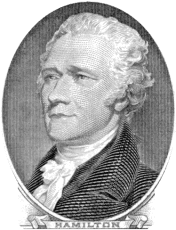 Another response to A Well Regulated Militia...:
Another response to A Well Regulated Militia...: Another response to A Well Regulated Militia...:
Another response to A Well Regulated Militia...:
A correspondent writes:
Better revise your argument on the 2nd Amendment.
The term "well-regulated" in 1787 refers to being in working order not regulation by law, like "a well-regulated watch".
Secondly, Nuclear arms were not included in the Old English defintion of arms used in 1787. Tench Coxe, a prominent federalist and life-long correspondent of Jefferson and Madison, wrote that what became the second amendment would confirm the people "in their right to keep and bear their private arms." James Madison endorsed the widely published article in which these words appear. Coxe's writings provide unmistakable evidence that eighteenth-century Americans defined muskets, rifles, and pistols as "arms,"and that they endorsed an individual "right to own and keep and use arms and consequently of self-defense and of the public militia power."
RE: Coxe, To the Public, Democratic Press (Philadelphia), Feb. 2, 1811
Rob's reply
>> Better revise your argument on the 2nd Amendment. <<
If you make a convincing case, maybe. Otherwise, not.
>> The term "well-regulated" in 1787 refers to being in working order not regulation by law, like "a well-regulated watch". <<
Says who? None of the Founding Fathers, I'll bet.
I quoted Hamilton on the 2nd Amendment in A Well Regulated Militia.... Again, he wrote:
This desirable uniformity can only be accomplished by confiding the regulation of the militia to the direction of the national authority. It is, therefore, with the most evident propriety, that the plan of the convention proposes to empower the Union "to provide for organizing, arming, and disciplining the militia...."
Seems pretty clear that regulating is similar to organizing, arming, and disciplining the militia. Arming presumably means providing or not providing arms as necessary. So whether the government arms the militia is the part and parcel of the 2nd Amendment.
And whatever regulating means, the "national authority" is the body charged with doing it. This is clearcut permission for gun control of some sort.
>> Secondly, Nuclear arms were not included in the Old English defintion of arms used in 1787. <<
So you agree the government can limit or ban every sort of semi-automatic machine gun? Great. We're in agreement on that point.
>> Tench Coxe, a prominent federalist and life-long correspondent of Jefferson and Madison, wrote that what became the second amendment would confirm the people "in their right to keep and bear their private arms." <<
They can keep and bear them consistent with government regulation. As Hamilton wrote: "What reasonable cause of apprehension can be inferred from a power in the Union to prescribe regulations for the militia...?" Again, he's talking about laws and rules that govern the militia, not the "working order" of the militia's equipment. The words "prescribe" and "regulations" (plural) both make that clear.
>> Coxe's writings provide unmistakable evidence that eighteenth-century Americans defined muskets, rifles, and pistols as "arms,"and that they endorsed an individual "right to own and keep and use arms and consequently of self-defense and of the public militia power." <<
That right limited by government regulation, you mean, just like every other right in the Constitution. You can't shout "fire" in a crowded theater, you can't sacrifice a child in the name of religion, etc., etc. No right is absolute.
>> RE: Coxe, To the Public, Democratic Press (Philadelphia), Feb. 2, 1811 <<
Sounds like an ex post facto justification of his position. Written in 1811, it has no bearing on the Founders' debate over the Constitution and Bill of Rights.
In short, I don't see anything I need to revise yet.
Rob
|
. . . |

|
All material © copyright its original owners, except where noted.
Original text and pictures © copyright 2007 by Robert Schmidt.
Copyrighted material is posted under the Fair Use provision of the Copyright Act,
which allows copying for nonprofit educational uses including criticism and commentary.
Comments sent to the publisher become the property of Blue Corn Comics
and may be used in other postings without permission.